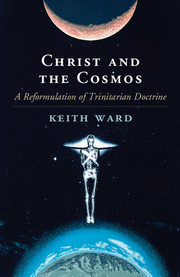Book contents
- Frontmatter
- Contents
- Preface
- Acknowledgements
- PART I THE THREEFOLD NATURE OF THE DIVINE BEING
- PART II THE BIBLICAL SOURCES OF TRINITARIAN THOUGHT
- PART III THE TRINITY, IMMANENT AND ECONOMIC
- PART IV THE SOCIAL TRINITY
- 22 Persons and Substances
- 23 The Idea of a Personal and Free Creation
- 24 The Logical Uniqueness of Persons
- 25 The Divine Nature and Freedom
- 26 Freedom in God and in Creatures
- 27 Persons as Necessarily Relational
- 28 An Ontology of the Personal?
- 29 Intra-Trinitarian Love
- 30 Infinite Gods
- 31 Divine Love and Necessity
- 32 Love and Alterity
- 33 Trinity versus Monotheism
- 34 The Passion of Christ
- 35 God and Abandonment
- PART V THE COSMIC TRINITY
- Bibliography
- Subject Index
- Name Index
31 - Divine Love and Necessity
from PART IV - THE SOCIAL TRINITY
Published online by Cambridge University Press: 05 September 2015
- Frontmatter
- Contents
- Preface
- Acknowledgements
- PART I THE THREEFOLD NATURE OF THE DIVINE BEING
- PART II THE BIBLICAL SOURCES OF TRINITARIAN THOUGHT
- PART III THE TRINITY, IMMANENT AND ECONOMIC
- PART IV THE SOCIAL TRINITY
- 22 Persons and Substances
- 23 The Idea of a Personal and Free Creation
- 24 The Logical Uniqueness of Persons
- 25 The Divine Nature and Freedom
- 26 Freedom in God and in Creatures
- 27 Persons as Necessarily Relational
- 28 An Ontology of the Personal?
- 29 Intra-Trinitarian Love
- 30 Infinite Gods
- 31 Divine Love and Necessity
- 32 Love and Alterity
- 33 Trinity versus Monotheism
- 34 The Passion of Christ
- 35 God and Abandonment
- PART V THE COSMIC TRINITY
- Bibliography
- Subject Index
- Name Index
Summary
It could be argued, anyway, that God does not have to create another perfect person in order to be loving. The sort of love God could have for another perfect person would not differ substantially from the sort of love God already has for the good. Remember that the created perfect person would be qualitatively identical to God (Swinburne's argument, unlike that of Zizioulas, requires that the divine persons are qualitatively identical), except for the fact of being created. Love of such a person would not be agape love, costly love for those who could be in distress. It would be a thin sort of love, consisting simply of creating, loving (in the sense of acknowledging its goodness), and respecting (permitting, or at least necessarily coming to mutual agreement about whatever it does). There would, in a sense, be more good in existence. But there would be no real mutuality about the relationship of the two divine persons, since they would each know exactly the same things and would not need to help each other in any way (since both would be omniscient and omnipotent and never need help). Indeed, both would have to do exactly the same things, since they are said to differ in nothing ‘except their relational properties’ (Swinburne, 1994, p. 189). Their relationship would seem pretty vacuous.
Swinburne describes the divine persons as existing ‘in mutual dependence and support’ (Swinburne, 1994, p. 190). But this is a Pickwickian sense of dependence and support. They do not need or rely on each other for anything except, Swinburne suggests, in the logical sense that each person depends upon the other person not eliminating them and continuing to permit their existence. But there is no real sense of ‘permitting’ for two necessary beings. You do not need to permit what could not fail to be. So even that very thin sense of dependence and support fades away. The relationship seems more like mutual and compulsory toleration than like mutual love. Any argument for real love in God would necessitate the creation of truly other, and qualitatively different, persons. If God is free (especially if God is free in a libertarian sense), that would make the creation of other persons an act of will, not of essence.
- Type
- Chapter
- Information
- Christ and the CosmosA Reformulation of Trinitarian Doctrine, pp. 191 - 198Publisher: Cambridge University PressPrint publication year: 2015



